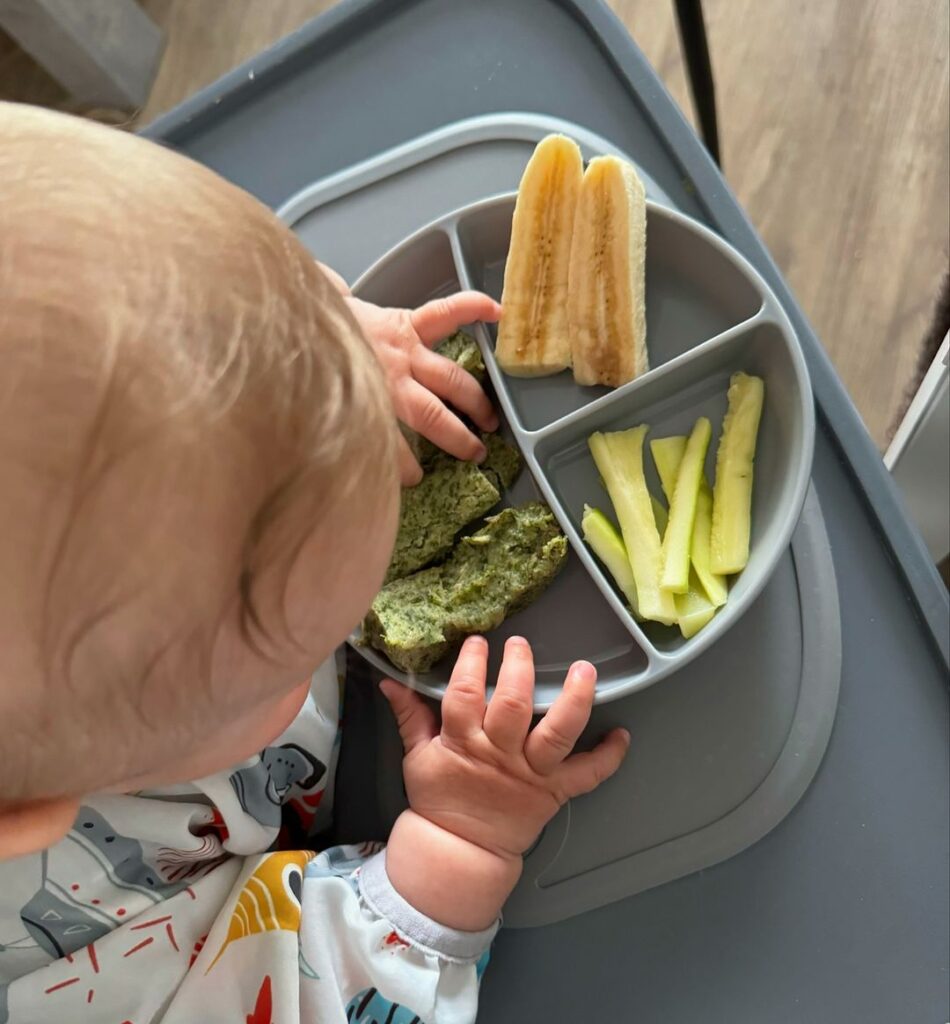Choosing the right infant cereal or other foods for your baby’s first solid meal can be both exciting and overwhelming. Have you set a date for this milestone yet?
Whether you already have a plan or are feeling confused due to an overload of advice from family and friends, it’s important to rely on trusted sources.
To help you navigate this transition, the American Academy of Pediatrics (AAP) offers valuable information and guidelines.
By following these expert recommendations, you can ensure your baby’s introduction to solid foods is a smooth and healthy experience.
When Can My Baby Begin Solid Foods?
The Dietary Guidelines for Americans and the American Academy of Pediatrics (AAP) recommend introducing solid foods to babies around 6 months old, but not before 4 months. To determine if your baby is ready, look for these signs:
- Can sit up with or without support.
- Controls their head and neck well.
- Opens their mouth when food is offered.
- Swallows food rather than pushing it out.
- Brings objects to their mouth.
- Grasps small objects.
- Moves food from the front to the back of the tongue to swallow.
Babies typically need to double their birth weight (around 13 pounds) to be ready for solids.
The AAP advises exclusive breastfeeding for the first 6 months, then continuing while introducing solid foods. Always consult your child’s doctor for personalized advice.
What Foods Should I Introduce to My Child First?
When introducing solid foods to your baby around 6 months old, there’s no need to follow a strict order.
By 7 or 8 months, your child can enjoy a variety of foods from all food groups, including infant cereals, meats, fruits, vegetables, grains, yogurts, and cheeses. Key tips for introducing solid foods:
- Offer a variety of fortified cereals (oat, barley, multi-grain) to avoid arsenic exposure from rice cereal.
- Foods should be soft or pureed to prevent choking.
- Introduce one new single-ingredient food every 3 to 5 days and watch for reactions.
- Early introduction of allergenic foods is safe, but check with your doctor, especially if your baby has severe eczema or egg allergy.
- Include iron and zinc-rich foods, like meats or iron-fortified cereals.
By a few months into solids, your baby’s diet should include a mix of breast milk/formula, meats, cereals, vegetables, fruits, eggs, and fish.
How Should I Prepare Food for My Child to Eat?
When starting your baby on solid foods, your baby might cough, gag, or spit up as they adjust. You can gradually introduce thicker and lumpier foods as they develop oral skills.
To prevent choking, ensure the food texture is appropriate for your baby’s development. Prepare foods that dissolve easily with saliva and don’t require chewing.
Serve small portions and encourage slow eating. Always supervise your baby while they eat. Here are some other tips for prepare baby food:

1. Start simple
Begin with single-ingredient foods without added sugar or salt, followed by breast milk or formula to prevent frustration. Gradually increase the amount of food.
Introduce one new food every 3 to 5 days to monitor for reactions like diarrhea, rash, or vomiting. If there’s no reaction, you can start combining ingredients.
2. Prioritize the essential nutrients
Around 6 months, babies need more iron and zinc. These are found in pureed meats and iron-fortified single-grain cereals.
3. Know the baby cereal basics
Mix 1 tablespoon of iron-fortified single-grain baby cereal with 4 tablespoons of breast milk or formula. Start with 1 or 2 teaspoons once or twice a day after feeding. Gradually thicken the cereal as your baby learns to swallow it.
Rotate between different cereals like brown rice, oatmeal, and barley to avoid arsenic exposure from rice cereal.
4. Add vegetables and fruits
Introduce pureed vegetables and fruits one at a time, waiting 3 to 5 days between each new food to check for reactions.
5. Finger foods
By 8 to 10 months, introduce finely chopped, soft finger foods such as soft fruits, vegetables, pasta, cheese, and well-cooked meat. Include foods that dissolve easily like baby crackers.
6. Handling food refusal
If your baby refuses solids, don’t force it. Return to breastfeeding or bottle-feeding exclusively before trying again in a week. Solid food introduction is a gradual process; most nutrition will still come from breast milk or formula initially.
Avoid putting cereal in a bottle unless recommended by a doctor for reflux, as it can cause choking and excessive weight gain. Consult a healthcare professional if refusal persists.
7. Monitor for any allergic reactions
After successful introduction of basic foods, introduce potential allergens like peanuts, tree nuts, eggs, dairy, wheat, shellfish, fish, soy, and sesame.
Introduce these at home with an oral antihistamine ready. Early introduction may lower the risk of allergies.
8. Introduce water
When your baby starts eating solids, offer water with meals to encourage healthy drinking habits.
9. Juice Guidelines
Avoid juice for babies under 1 year. If given, ensure it’s 100% fruit juice without added sugar, limited to 4 ounces a day.
10. Avoid certain foods
Do not give cow’s milk or honey before age 1. Avoid choking hazards like hot dogs, chunks of meat or cheese, grapes, raw vegetables, nuts, seeds, popcorn, hard candy, marshmallows, and sticky food clumps. Spread peanut butter thinly or puree it with other foods.
11. Homemade baby food
Homemade baby food can save money and ensure healthiness. However, avoid giving babies under 4 months spinach, beets, carrots, green beans, or squash due to potential nitrate content.
12. Make mealtime fun
Engage your baby during feedings and use a stable highchair. Let your baby explore food textures and use a spoon. Transition to a cup around 9 months to aid weaning from the bottle.
Getting Your Baby Started With Solid Foods
Introducing solid foods to your baby is an exciting milestone, marking a new phase in their development. Whether you’re ready to begin or still sorting through advice, it’s crucial to rely on trusted sources.
By following these recommendations, you can ensure a smooth and healthy transition. Remember, every baby is different, so it’s essential to consult your pediatrician for personalized advice tailored to your baby’s unique needs.
This will help you navigate this important phase with confidence and joy, ensuring your baby enjoys a positive and nutritious start to solid foods.
For more baby care tips and expert advice, visit Moon Mystical. We offer a wealth of information to support you through every stage of your parenting journey.















Leave a Reply
View Comments